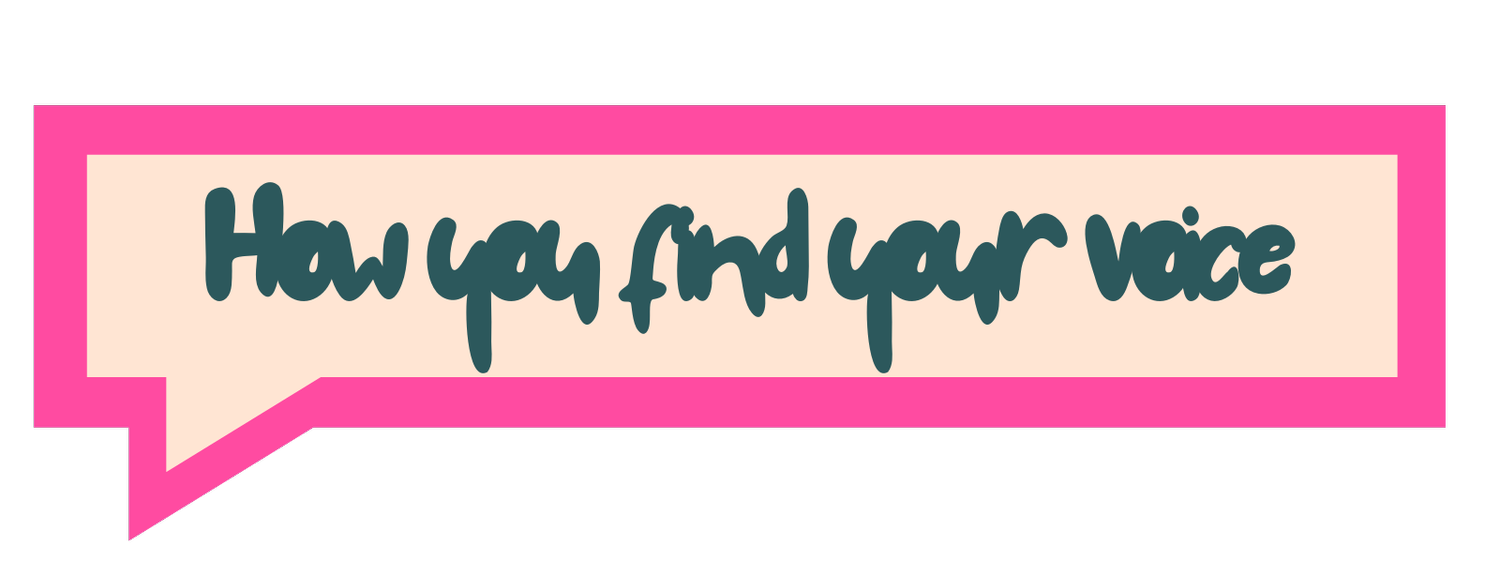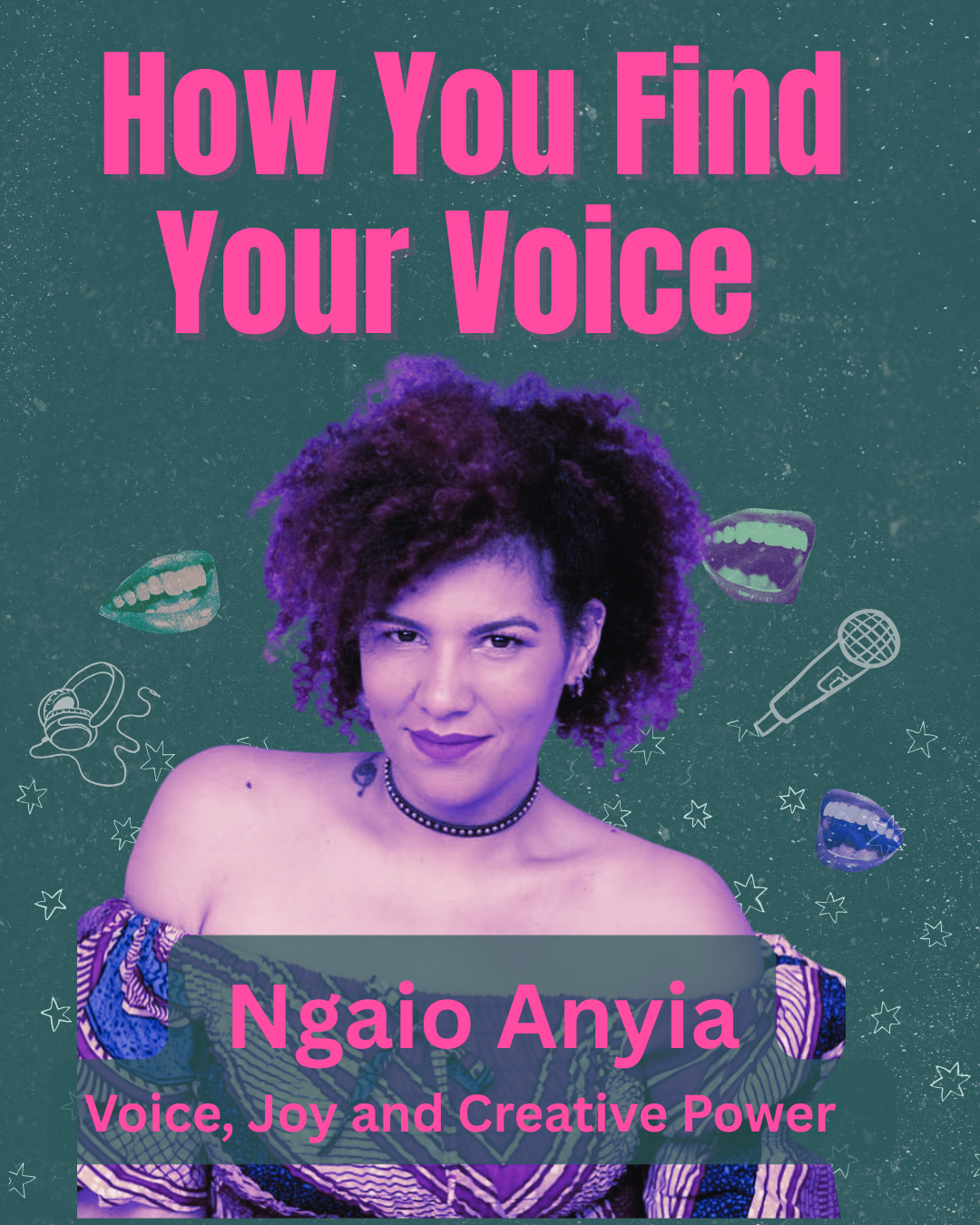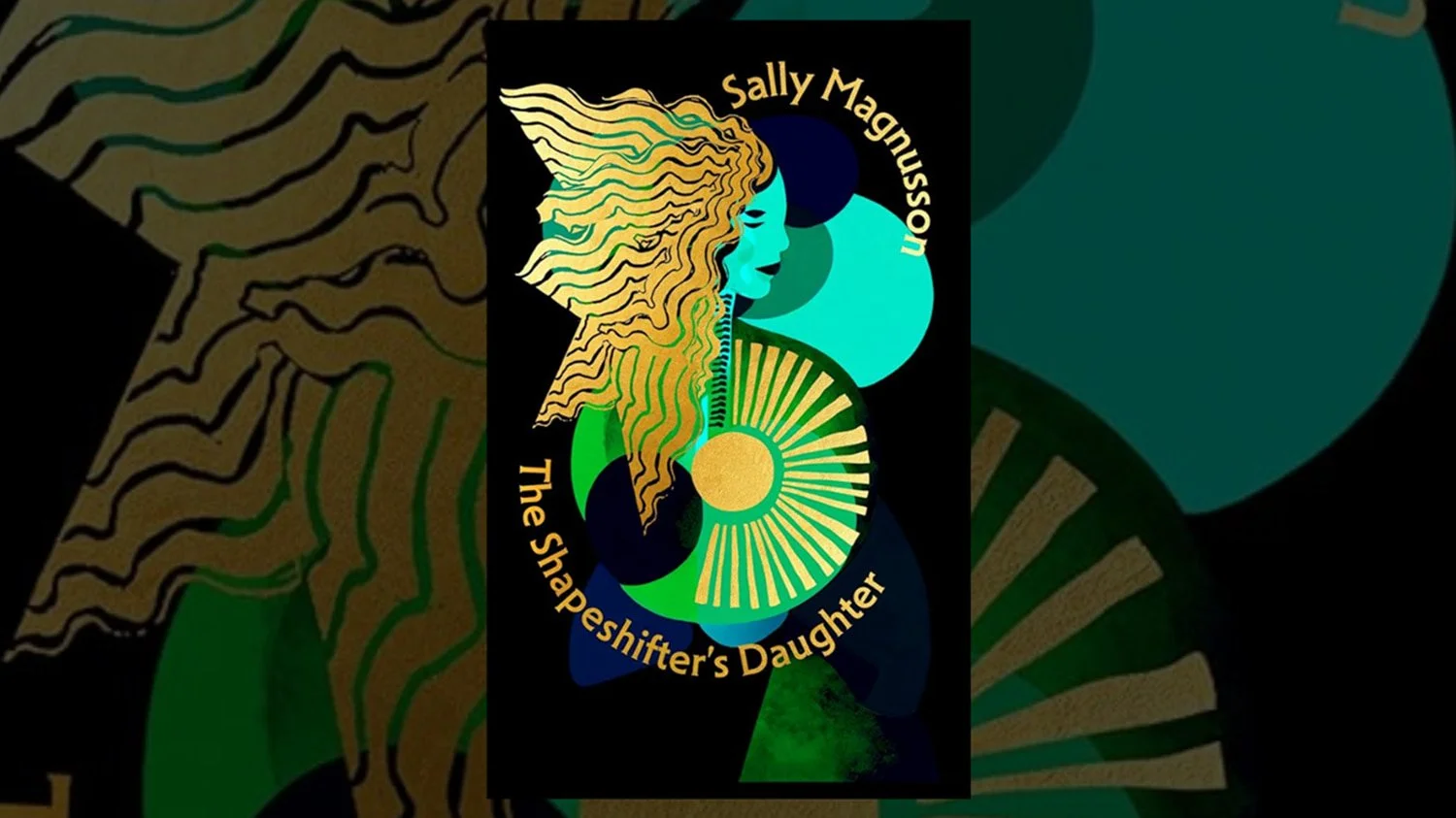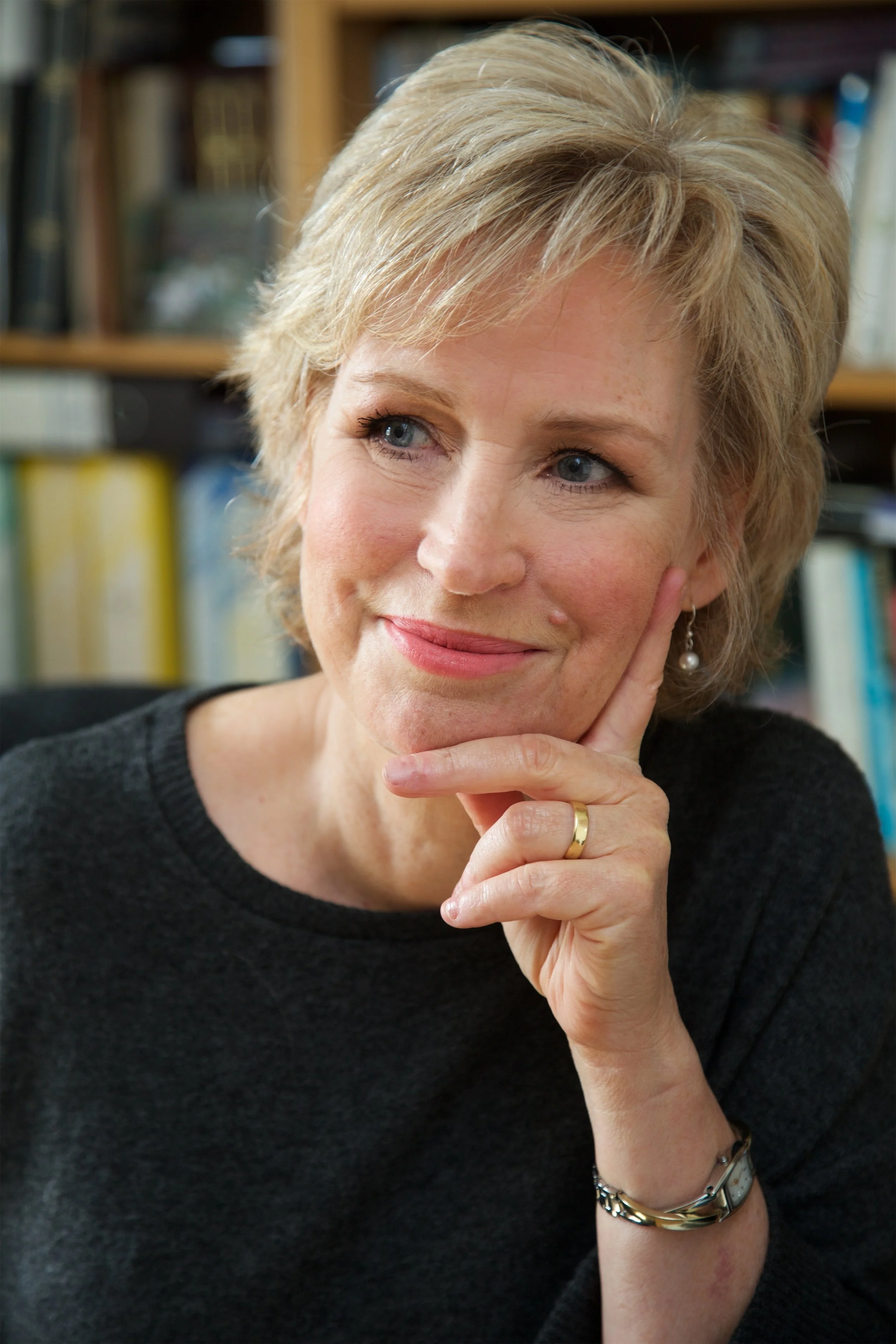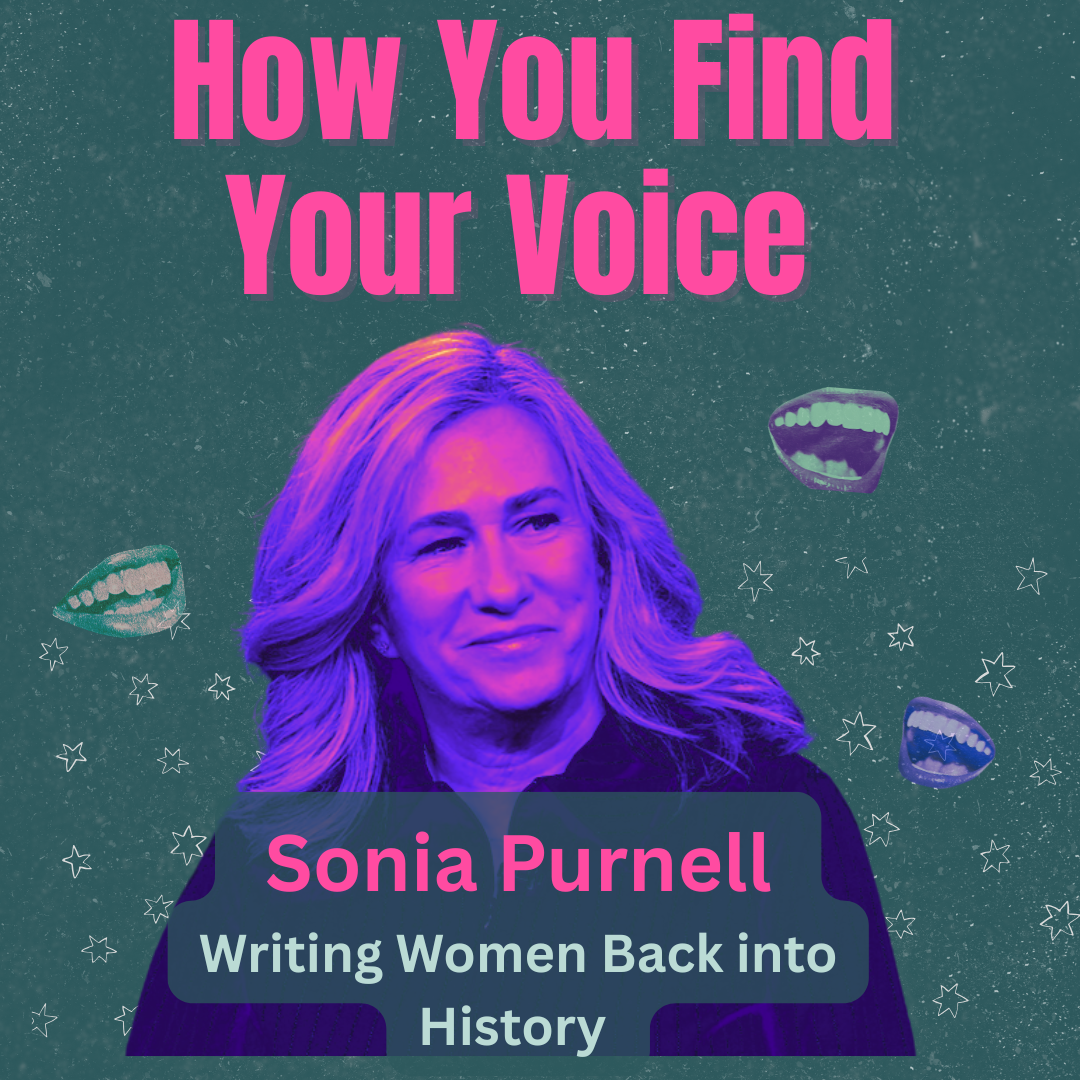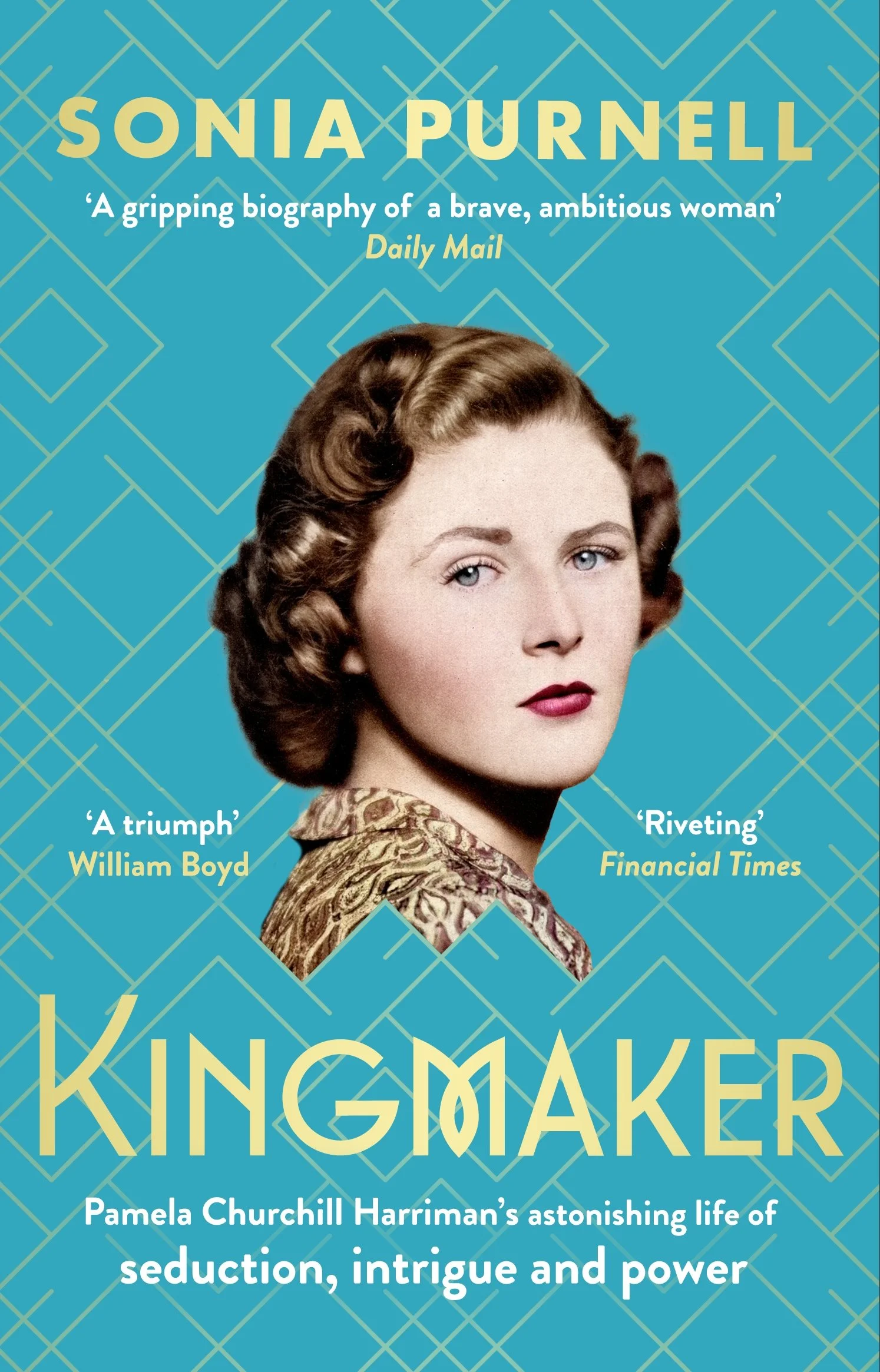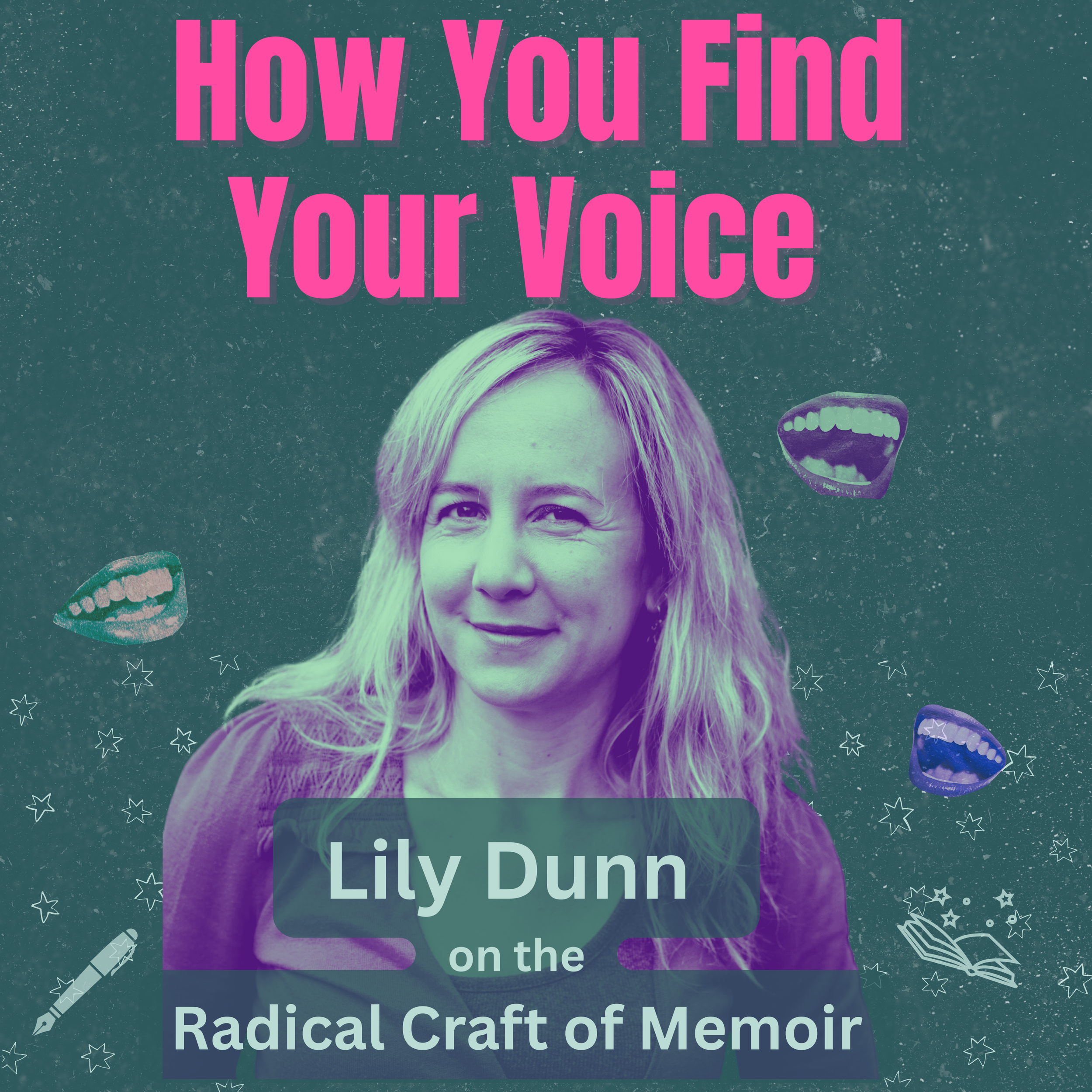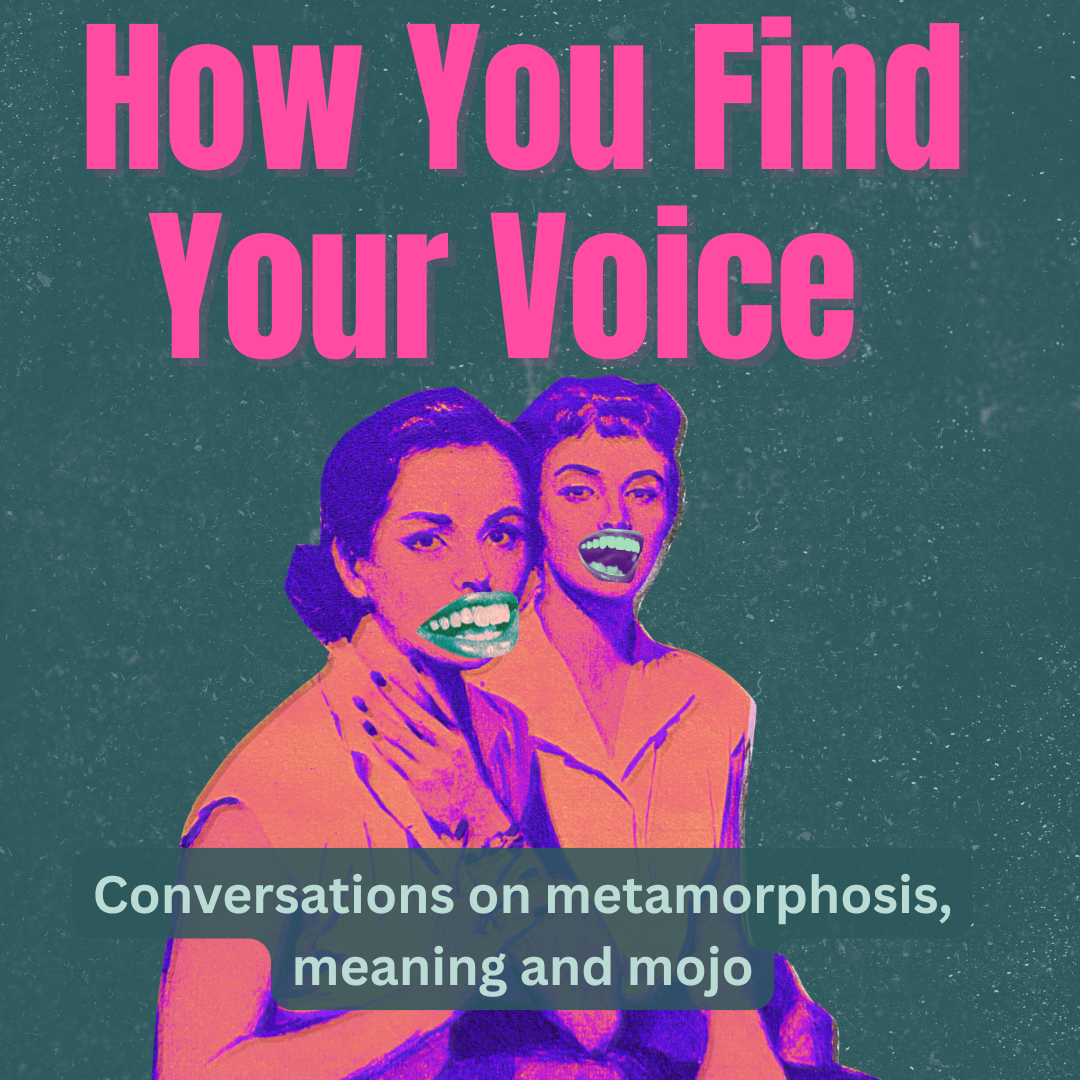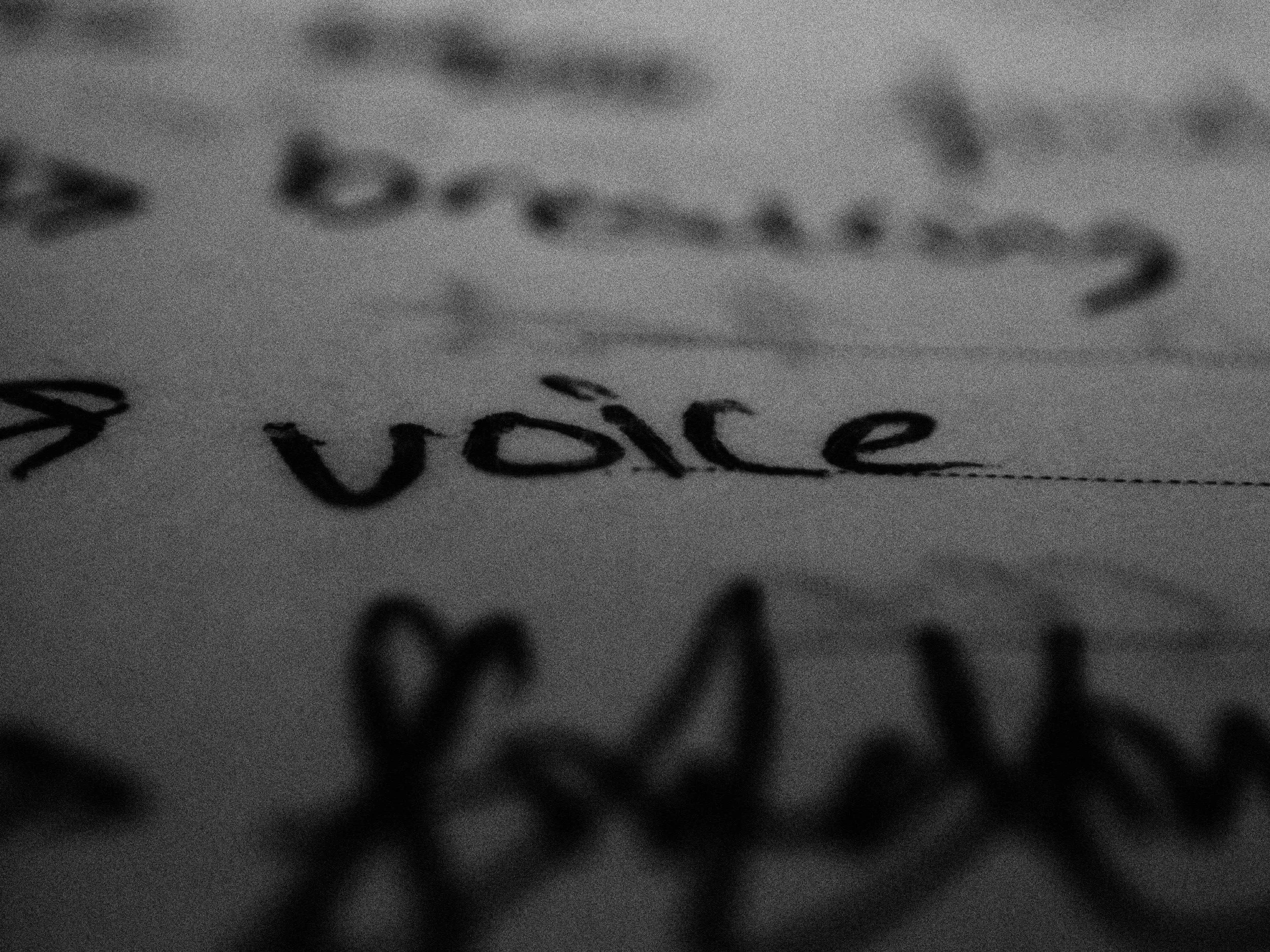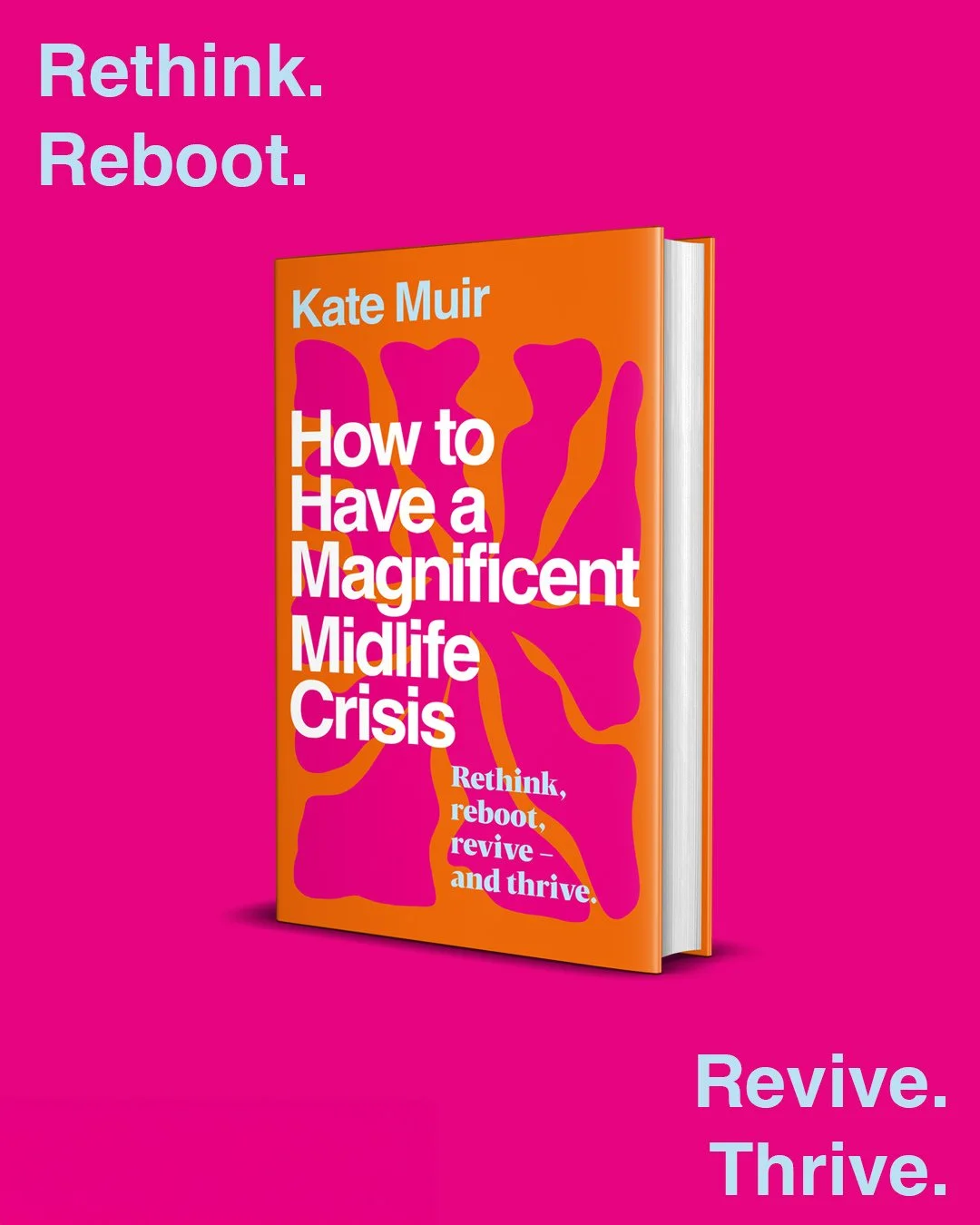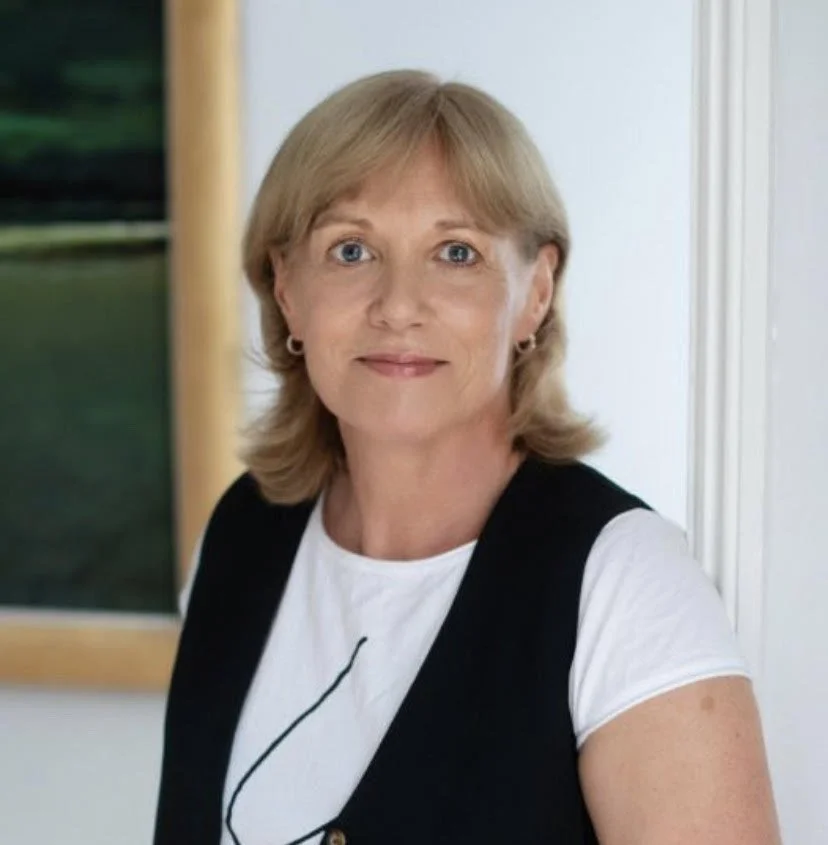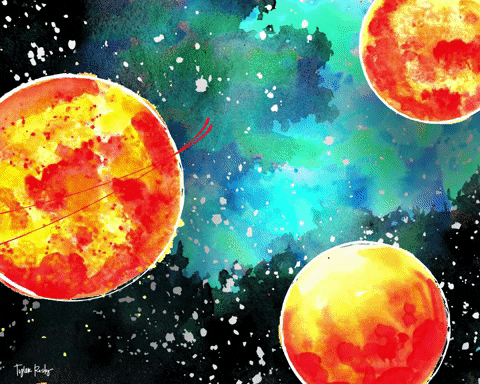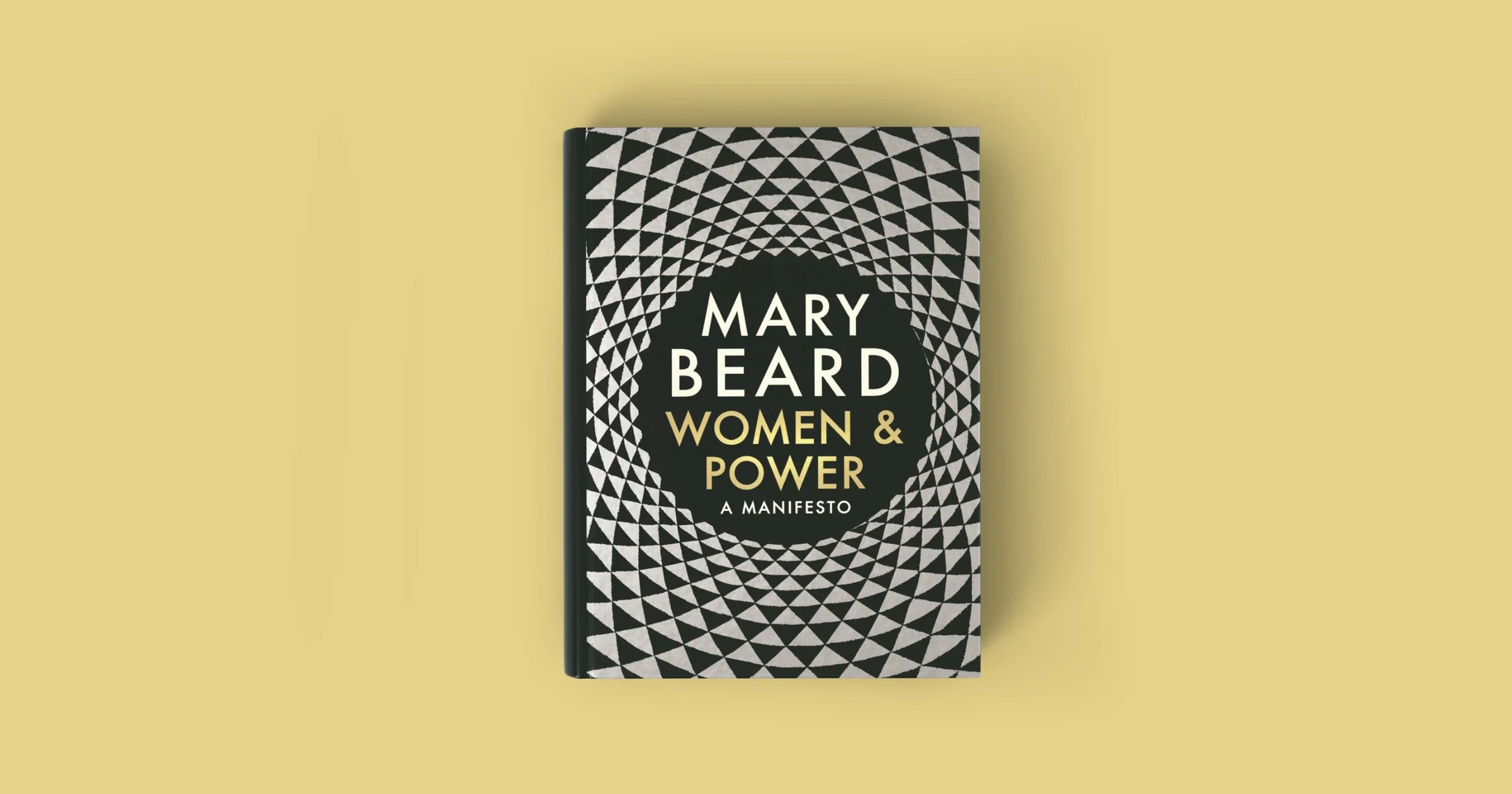Ngaio Anyia on Losing Your Voice and Finding Your Joy
What happens when you lose your voice — not metaphorically, but literally? In this conversation, Ngaio Anyia reflects on silence, reinvention and why voice is something we keep finding over time.
When Your Voice Changes Over Time
When Ngaio Anyia joined me on the How You Find Your Voice podcast, I assumed we’d spend most of the hour talking about performance and confidence. We did, in part. But what I keep thinking about is something more specific: what it actually means to lose your voice, and what happens when it comes back.
Ngaio Anyia HYFYV episode artwork
Losing Your Voice
Ngaio’s relationship with voice began early, and not gently. As a child, after sustained bullying, she stopped speaking almost entirely. Her mum only realised something was wrong when she noticed how quiet her daughter had become. What struck me wasn’t simply the silence, but where all that energy went instead: into books, writing and music. Even now, Ngaio talks about herself as extroverted in many ways, yet someone who needs real quiet to recuperate after performing. I suppose part of me assumed that gifted performers and extrovert types lived off the buzz of live performance; that it doesn’t cost them as much as (us) introverts. So I found that really interesting.
Voice loss returned later, this time physically. After vocal strain, she was told to stop speaking for months or risk long-term damage. For a singer, that’s devastating. And yet she didn’t step away from music, but instead moved sideways into DJing. Her creativity needed expression, or she’d go mad, as she explains. As her voice recovered, she began layering live vocals into DJ sets, and from there moved further into production, pulling her own tracks apart and rebuilding them from the inside. By losing her voice, she actually ended up accessing a different form of creativity, one that allowed her more creative control
Why it’s important to mix things up creatively
We talked about authorship and the producer gap that still shapes so much of the music industry. Ngaio pointed out how few women are credited as music producers, and how that changes everything from the way a track sounds, to questions of power and who gets listened to. She talks about how she wanted to pursue producing for all of those reasons and so that she wasn’t stuck in the vocalist lane; brought in for a hook while the weightier decisions happen elsewhere.
Another thread I loved was her matter-of-factness about time and ageing. She explained that her voice doesn’t sound the same now as it did when she was eighteen. The range might be similar, but the texture and delivery have changed with age and experience. It sounds obvious written down, but it disrupts the cultural narrative that artists arrive early, fully formed, and then remain fixed there.
What advice does she have about finding your voice?
Towards the end of our conversation, I asked what she’d say to a woman trying to find her voice again. She said that she should start with joy. That the focus shouldn’t be on what performs well or looks impressive; not what you think you should be doing, but what actually lights you up. She talked about taking herself on solo artist dates, inspired by the Artist’s Way (the circus, a photography exhibition). These are small acts of creative refuelling that have nothing to do with output.
I didn’t come away from this episode with a neat story about confidence gained. I came away with something truer: voice doesn’t stay put. Bodies change. Life intervenes. Sometimes you lose your voice and you have to find another route back to yourself, and when you return, you might not sound the same. The main take-away is that you don’t “find your voice” once and for all, but it’s an ever-evolving process that changes as you do.
Listen to the full conversation with Ngaio Anyia on the How You Find Your Voice podcast here.
Sally Magnusson: Myth, Memory and Learning to Trust Your Imagination
A thoughtful conversation with Sally Magnusson about Norse myth, memory, and learning to trust your imagination through writing later in life.
Episode 3: A Conversation with Sally Magnusson
Sally Magnusson
When I spoke to Sally Magnusson for the How You Find Your Voice podcast, she was in that strange moment just before publication. The Shapeshifter’s Daughter had not even arrived in physical form yet. A few early reviews had come in and she was relieved, and quietly pleased, that the book seemed to be finding its audience.
We began with Norse mythology. Sally talked about how different these stories feel from Greek myths: colder, harsher, filled with winter creatures and elemental forces. She had long admired what writers like Madeline Miller and Natalie Haynes had done with classical retellings, and had kept wondering why no one had done the same for the Norse world.
When she returned to the sources, she saw why. Most of the female figures were thinly drawn: wives, decorations, beautiful but passive. Except for Hel, the daughter of Loki, cast into the underworld and made ruler of the dead. Hel fascinated her.
Over time, Hel had been reshaped by Christian and Victorian ideas about punishment and decay. Sally wanted to step inside her story instead, to imagine what it might feel like to be exiled, assigned responsibility for death, and turned into a symbol of fear.
Rather than retelling the myth from the outside, she wrote from inside Hel’s consciousness. Alongside this runs the story of Helen Firth in modern Orkney, returning to childhood memories as she faces terminal illness. The two narratives begin to mirror each other and speak to questions about ageing, loss and meaning.
The Shapeshifter’s Daughter, by Sally Magnusson
We talked about memory, something that runs through all of Sally’s work. As she spoke, she began to realise aloud that memory might be the thread connecting her memoir about her mother’s dementia, her historical novels, and this book. Watching her contemplate this was one of my favourite moments of the conversation.
Storytelling, she said, has always been central to her life. Her father, Magnus Magnusson, translated Icelandic sagas. He was a historian and journalist - her mother was a journalist too - and it seems that stories were the lifeblood of her family. They were central to Sally’s life as she had her own family too. Even during the years of raising five children and working in broadcasting, she kept writing whatever she could, because she needed to.
Sally didn’t start writing novels until later. At first, she approached fiction as she had always approached non-fiction, clinging to research and factual structure. At first her writing resembled a documentary, more than a novel, but things clicked when she learned to inhabit her characters fully; to write from inside their experience rather than around it.
I love how Sally describes this shift as jumping off a tree and seeing if she could fly. She began to trust her imagination instead of relying solely on research and verification. Over time, she allowed herself more freedom, blending realism, myth and folklore, as in The Shapeshifter’s Daughter.
Sally also manages to blend the dark and the light in this book. As she points out, you cannot write about death without acknowledging grief, but it is ultimately a celebration of life.
Talking to her reminded me that finding your voice is rarely sudden. It is built slowly, through experience, attention, failure, persistence and trust. There isn’t a shelf life on creativity, which I find reassuring and exciting.
Sonia Purnell on Kingmaker, power and the woman history chose to forget.
A conversation with Sonia Purnell about Kingmaker, women’s power behind the scenes, and the history that gets quietly rewritten.
I was joined by award-winning biographer Sonia Purnell to talk about her latest biography, Kingmaker. It’s a gripping account of the life of Pamela Churchill Harriman, a woman who operated at the very centre of 20th-century power and yet remains largely absent from the historical record.
Pamela’s life reads like fiction. She moved from a failed debutante season to the heart of wartime diplomacy, from Churchill’s inner circle to the making of an American president. But Kingmaker is not interested in glamour for its own sake. It asks harder questions about power, gender, invisibility, and the roles women were permitted to play when formal authority was denied to them.
This conversation explores Pamela’s extraordinary influence, Sonia’s five-year research process, and why certain women are remembered as footnotes rather than as forces in their own right.
Who was Pamela Churchill Harriman?
Born Pamela Digby into a financially precarious aristocratic family, Pamela was raised to marry well rather than think deeply. She was discouraged from education, shielded from politics, and groomed for social survival rather than intellectual independence.
And yet, from a young age, she was intensely curious about the world, especially politics and power. Sent to Munich in 1937 as a teenager, she became fascinated not by dances or suitors but by the rise of Nazism. This early political alertness set her apart and marked her out as strange within her own class.
Her first marriage, to Winston Churchill’s son Randolph, placed her at the centre of power just as the Second World War began. From there, her life changed irrevocably.
Kingmaker Cover art
What we talk about in this episode
How Pamela became an informal but crucial diplomatic asset during the Second World War
The role she played in securing and sustaining Anglo-American relations
Why Churchill and Clementine actively supported her wartime work
The idea of a “strategic sex life” and what it reveals about women’s agency under constraint
Why Pamela struggled after the war, when women were pushed back out of public power
Her later influence on American politics, including Bill Clinton’s rise to the presidency
How she helped shape peace efforts in Bosnia while serving as US ambassador to France
Why misogyny and moral judgement obscured her achievements for decades
A moment that stayed with me
Sonia describes Pamela as “invisible but decisive”. It is a phrase that explains both her power and her erasure.
Pamela rarely sought the spotlight. She operated through relationships, trust, emotional intelligence, and an acute understanding of how power actually moves. She knew which egos needed soothing, which alliances needed shoring up, and when history demanded intervention rather than restraint.
Because this work happened behind closed doors, it was easy to dismiss her as a social climber or seductress. What Kingmaker makes clear is that this dismissal was not accidental, it was systemic and deliberate.
Why Pamela’s story matters now
Pamela Churchill Harriman spent her life trying to prevent conflict, or to bring it to an end once it had begun. From the Second World War through the Cold War and into the 1990s, she worked to stabilise alliances in moments of extreme political fracture.
As Sonia points out, the resonances with the present are uncomfortable. Rising extremism, democratic fragility, misinformation, and geopolitical tension all echo the periods Pamela lived through.
Her story forces us to ask who gets written into history, and who is written out. And how many women like Pamela shaped the world without ever being granted official credit.
Listen to the full episode
How You Find Your Voice podcast artwork featuring Sonia Purnell
You can listen to the full conversation with Sonia Purnell on the How You Find Your Voice podcast here.
This episode is for anyone interested in women’s history, power behind the scenes, and the stories that only surface when someone is willing to look properly.
Lily Dunn on memoir, voice and transformation.
A conversation with writer and memoirist Lily Dunn about voice, truth-telling, and the courage it takes to write your life into meaning.
A conversation with Lily Dunn
I spoke to Lily Dunn just before the publication of Into Being, her book about memoir writing and the radical craft of telling your own story. Memoir at its heart is all about telling your story in your own voice, which couldn’t be more aligned with How You Find Your Voice. From talking to Lily, it became clear that memoir is often less about self-expression and more about claiming authority over your own life.
How You Find Your Voice podcast artwork, featuring Lily Dunn.
Lily is the author of Sins of My Father, a powerful memoir about growing up in the orbit of her father’s involvement in a 1970s cult, and the long psychological legacy that left in its wake. In this conversation, we talk about what memoir really asks of a writer, why editors matter so much, and why writing from lived experience can be both destabilising and deeply empowering.
This episode is for anyone who feels drawn to writing their own story but is unsure whether they’re allowed to. Or whether it’s worth the cost.
What we talk about
Why memoir is not just a series of events but an act of meaning-making
The role of editors and mentors in helping writers see what they cannot yet see themselves
How writing memoir requires separating yourself from your life and learning to see yourself as a character
Why confidence and authority often come late in the memoir process, not at the beginning
The relationship between therapy, psychoanalysis, and reflective writing
Why women often struggle more than men to give themselves permission to write honestly
The fear of hurting family members and how writers learn to live with that fear
Memoir as an act of generosity rather than self-absorption
What happens when private stories are made public, and why the aftermath is rarely what we imagine
A moment I keep thinking about
Lily talks about the shift that happened late in the writing of Sins of My Father, when her editor encouraged her to “lean into the narrative”; a phrase that unlocked something fundamental for her. It marked the difference between writing scenes and writing memoir.
In memoir, the reflective voice matters. This is what Lily describes as the “dual narrative”, the adult voice looking back, finding meaning, drawing connections, and making sense of what happened. Lily describes this as the moment she realised she was allowed to tell the reader what she thought, that her understanding had value. This is the difference between recounting events and offering insight; it’s what brings value to the reader and makes it universal.
However, for many writers, especially women, permission to do this is the hardest part.
Why this conversation matters
Memoir is often dismissed as indulgent or self-obsessed. Lily’s work makes a compelling case for the opposite. The best memoirs are driven by inquiry, courage, and a refusal to accept the official version of a story that never quite rang true.
As Lily puts it, many people are drawn to memoir because they have never had the chance to be properly heard. Writing becomes a way of reclaiming voice, not just for the writer, but for readers who recognise themselves in the story.
This conversation is also a reminder that publishing a memoir is not just about catharsis. It is about craft, time, an unflinching look at yourself and the past. It’s about rigour and ethics. It’s ultimately and act of bravery; the self-examination required and the willingness to stand by the work even when it is uncomfortable.
Listen to the full episode
You can listen to the full conversation with Lily Dunn on the How You Find Your Voice podcast here.
Why I’m centring women’s voices
A reflection on why this podcast centres women’s voices, and how power, culture, and gender shape who gets heard and who is still asked to stay quiet.
A considered choice
I want to be clear about something from the outset. This podcast is mostly about women.
That doesn’t mean men aren’t welcome. Some will absolutely be part of these conversations. But the focus is deliberate. It exists because women’s voices have historically been marginalised, softened, interrupted, edited down, or rewritten. That pattern is long-standing, well documented, and still very much with us.
How women are taught to speak
From an early age, many women are taught not just how to speak, but how to manage themselves as they do so. We learn to qualify our opinions, soften our delivery, and apologise in advance for taking up space. We are encouraged to be agreeable rather than authoritative, polite rather than direct, accommodating rather than assertive.
This conditioning is often subtle; it’s cultural rather than explicit, but its effects accumulate over time.
Where this shows up culturally
These habits do not stay confined to childhood. Far from it. They carry through into adult life and show up in meeting rooms, classrooms, publishing, politics, media, and the arts. They shape who feels entitled to speak, whose confidence is praised, and whose anger is dismissed.
They also influence which stories are framed as universal and which are labelled niche, emotional, or secondary. Creatively and culturally, women’s stories are still too often treated as personal rather than political, experiential rather than intellectual.
Why this matters now
Around the world, women’s rights are under pressure. Hard-won protections around bodily autonomy, safety, education, work, and representation are being rolled back, challenged, or quietly eroded. At the same time, the language of empowerment is frequently diluted, used as branding rather than as a genuine challenge to power.
In this climate, voice becomes more than expression: it becomes a question of authority. It’s about who is listened to. It’s about who is believed and who is allowed to speak without qualification.
Centring women’s voices is not exclusion
For me, centring women’s voices is not about exclusion, but about creating a space for women and their stories to be heard.
It is about creating a space where women do not have to compress their thinking, manage their tone, or borrow authority in order to be taken seriously.
I’m interested in women who have had to navigate silencing, constraint, or expectation, and who have found ways to speak anyway. Women who have pushed past internalised limits or external barriers to find purpose, meaning, or creative expression on their own terms.
Often, these are elders of female experience. Not necessarily by age, but by depth. The wisdom they can pass on comes from what they have lived through, questioned, and learned. And by the clarity that comes from surviving, reflecting, and choosing to speak honestly.
What this podcast is really about
This podcast is about understanding how voice is shaped by culture, history, and power, and about what becomes possible when women stop managing themselves and start speaking as they are. I feel this is very necessary. Especially now.
Have you ever lost your voice?
A personal reflection on losing your voice, finding it again, and why this podcast exists in the first place.
What does it mean to find your voice?
This is the part where I put theory into practice. Essentially my hunch is that finding your voice involves using it.
Introducing the How You Find Your Voice podcast.
Each episode is a conversation with someone who has found their voice, and isn’t afraid to use it. Think writers, artists, activists, thinkers, entrepreneurs. People who have found purpose, passion, or a way of expressing themselves that is uniquely theirs.
We talk about their work, but also their lives; the turning points, the moments of doubt. The barriers they had to push through. How did they build their confidence, or rebuild it after it was lost? How did they find the courage to do it?
Why this podcast, and why now?
Part of this project is personal. I’m reclaiming my own voice, yes, and I’m trying to get my mojo back. But it’s more than that.
I want to understand voice from all angles: historically. Culturally. Socially. Biologically. Mythically. Even, sometimes, mystically. And most of all, through a female lens.
Let’s not beat about the bush. I’ll mostly be speaking to women (alongside non-binary people, trans women) and the occasional brilliant man. Not because this is about exclusion, but because women’s voices are still too often marginalised, softened, or sidelined, and I’m interested in what happens when they’re centred.
That said, these conversations are for anyone who recognises the quest. Everyone’s welcome.
A bit about me
My name is Jessie. I’m a writer by trade, a novelist by aspiration, and a lifelong listener.
I don’t have all the answers. I’m not a certified coach with patented life theories, or a high-flying CEO with productivity hacks. I’m no guru. What I am is deeply curious about other people and their stories.
I’ve programmed and run a literary and storytelling series for over a decade, and I’ve seen first-hand how powerful it can be to hear someone speak honestly about their life and work. Stories don’t just entertain, they orient us and remind us of what’s possible. That’s what this podcast is here to do.
What you can expect
Season one features conversations with some genuinely phenomenal women. I’ve interviewed some award-winning, internationally acclaimed writers, creatives, and activists, all talking about the courage and creativity it takes to find your voice.
You’ll hear women speaking openly about things we’re often taught to keep quiet about. Writers bringing forgotten women back from the footnotes of history. Poets and novelists giving silenced mythological characters their voices back. People who’ve pushed through self-doubt, silencing, or fear to make their work and claim their space.
Their stories are generous, thoughtful, and quietly transformative. I can’t wait for you to hear them.
An invitation
If you’re trying to find your voice, or reclaim it.
If you’re in a liminal moment.
If you love books, ideas, and big, thoughtful conversations.
If you’re curious about how people become who they are.
Then this podcast might be for you…
Season one is dropping very soon. Follow, subscribe, and join me on this voyage into voice. Maybe, just maybe, we’ll find ours along the way.
How to Have a Magnificent Midlife Crisis: Kate Muir on Menopause, Brain Health and Midlife Transformation
Kate Muir on menopause, memory, brain health and midlife reinvention - plus the little-known link between estrogen and Alzheimer’s risk.
How to Have a Maginficent Midlife Crisis
Midlife: not a crisis, but a becoming.
A couple of weeks ago I had the pleasure of talking to author, documentary maker and women’s health and menopause campaigner, Kate Muir, about her brilliant new book, How to Have a Magnificent Midlife Crisis.
Some of you might remember Kate from our 5x15 Bristol menopause special last year. She chaired a fascinating conversation with the writer, Sharon Blackie, which delved into the wise women of myth and folklore (featured in Sharon’s latest book). It was a special night in a candle-lit de-consecrated church. As they discussed giantesses and goddesses, witches and hags, they interwove their own stories of menopause and midlife transformation. The evening even gets a mention in Kate’s new book (yes, I was quietly chuffed when I spotted that)!
Wise Women: Menopause Special Event with Sharon Blackie and Kate Muir , 5×15 Bristol, October 2024
Launching How You Find Your Voice
So when I began shaping what How You Find Your Voice — and how to launch it — I thought of Kate. I felt that this book and the themes it explores, would be the perfect jumping off point for this new, platform, which is all about finding your passion and purpose. And voicing it.
I started HYFYV, as I’ve become obsessed with the idea of finding my voice; especially as a woman; especially as one navigating the messy middle part and the ever shifting sands of identity; especially as I hurtle towards the time of life when women are meant to become invisible, preferably unseen and unheard.
I know it’s not just me. So many women in my life have lost touch with their voice, (read their sense of self) during these big transitional times, whether they be motherhood, mental health crises, relationship breakdowns or (peri)/menopause. Sometimes it’s everything all at once: AKA the shit storm. Just one heady soup we’re swimming in, trying not to drown.
As I discovered from this conversation with Kate, women really do have a complete neurological, hormonal and mental overhaul three times in life. These points can be crisis points, but they are also potential moments of rebirth. This unshackling, this rebirth is what this project is all about. And this conversation captures all of these things.
Kate Muir
How She Found Her Voice
I asked Kate what set her on this path. “It was a really personal becoming political moment for me,” she said.
Her mum had just died of Alzheimer’s. Kate was working as a film critic, but started forgetting words — not obscure ones, but everyday things. One day she wrote shaver on a shopping list because she couldn’t remember the word razor. It scared her.
“I thought, this is me forgetting a domestic noun, like my mum had been doing. And I thought, I've got Alzheimer's. Rang my mates, said I've got Alzheimer's. They were like, no, you don't, you just need to go and get HRT, but nobody talks about it”
She got it privately. Within a week, her memory returned. The fog lifted. The heart palpitations stopped. She could speak without notes again.
And that’s when the bigger questions began. Why hadn’t she known menopause could affect memory? Why wasn’t this information readily available? What if this wasn’t just her story, but every woman’s?
“I was stunned,” she said. “Why couldn’t I, as a journalist, Google menopause and find that it causes memory loss and heart palpitations? Why didn’t I know there’s a new safer kind of HRT? What about all the other women losing their memories…losing their jobs?”
She described the moment she realised the scale of it:
“I thought, my God…this is the best story I've ever found in my career in journalism. And I had that animally tingly feeling that this was a great story that I was going to do everything I could to research and run with it.”
She met Dr Louise Newson, who taught her how to read science papers. She started learning how to decode headlines and dig into actual data. She discovered that she loved it, that this was her midlife calling: “I realized I love science and I love explaining science to people”
Most importantly, this wasn’t just about reclaiming her own mind. It was about helping other women keep theirs.
A light bulb moment
The Mind- Hormone Link
The more she learnt, the more she came to understand the profound effect hormones have on mental health, but also on the physical health of the brain.
She discovered that women make up two-thirds of Alzheimer’s diagnoses and that oestrogen has a powerful role to play in protecting memory and cognition.
“It was like a big detective story,” she said. “And then when Alzheimer’s came into it — and the good news started to grow — I became obsessed with winning the menopause battle against the people saying, ‘just drink sage tea and carry on.’ That is absolute bollocks.”
Kate is passionate about educating women about the link between menopause and mental health. As you’ll see if you watch the recording, Kate’s a real hoot! We chatted about everything from testosterone improving your orgasms to the unexpected upsides of vaginal estrogen, which she describes as being, “like Chanel for your vagina.”
“vaginal estrogen... ‘like Chanel for your vagina’”
Kate might describe herself as ‘Presbyterian’, but she’s certainly not prudish, nor one to shy away from a frank discussion about bodily functions - or her experiences. You can see why the women in the book were happy to share their stories with her. She was very generous in what she shared about her life and her own, self-described Thelma and Louise style car crash of a midlife crisis. Ultimately, she wrote this book so other women wouldn’t make such a mess of it, as she claims she did.
What I learnt
I so enjoyed our conversation. My only regret is that I didn’t manage to cover everything I wanted to ask. I had been wrangling children all day and was feeling particularly frazzled by the time event drew round, which just underlines why the burning question for me, and the one I forgot, was about what I see as ‘the other midlife squeeze’.
In the book, Kate describes midlife as a ‘sniper’s alley’, with everything coming at you all at once. I wish I’d asked her about the women in the squeeze of late motherhood and perimenopause; what had she discovered about the cohort of women having all these symptoms whilst also (potentially) breastfeeding and raising small children, with all the demands that entails. The women who are intensively mothering, whilst also trying to wrestle back some sense of self, have a career, and stave off hormonal surges or tides of rage. There are an increasing number of us now.
“I wish I’d asked her about the women in the squeeze of late motherhood and perimenopause; what had she discovered about the cohort of women having all these symptoms whilst also (potentially) breastfeeding and raising small children, with all the demands that entails?”
Kate has so much to say and is such a wealth of information that there wasn’t time to cover it all. But we covered a lot and here are some oft he most fascinating snippets…
Here are my top 6 take-aways:
1. Your brain is rewiring. Literally.
Women’s brains rewire three times in their lives; puberty, motherhood and menopause. During menopause, the brain switches fuel sources - from glucose to ketones - which can cause brain perimenopause brain fog, confusion, and memory loss. It’s not imagined, and it’s not inevitable. With the right support, clarity returns. For Kate, memory came back within a week of starting HRT.
Kate did a mini slide show to demonstrate some of the brain science. Here is a small section:
She also talked about the concept of “baby brain” and yes, it’s a thing and no, you’re not stupid.
“You know, so the idea that you get baby brain and you're stupid and you forget stuff, no, you're getting a rewiring, which is making you more emotionally astute for a lot of people.”
Turns out it’s an upgrade! Though admittedly it doesn’t feel like it at the time.
2. Vaginal estrogen is life-changing — and no one tells you.
One of the biggest revelations from Kate’s talk was how local vaginal estrogen can transform quality of life. It helps rebuild the vaginal walls, supports the bladder, improves collagen, and reduces stress incontinence. But more than that, it restores the vaginal microbiome by supporting lactobacilli, the healthy bacteria that protect against UTIs and inflammation. It’s safe, long-term, and under-prescribed.
3. Late-diagnosed ADHD? You’re not alone.
Menopause doesn’t just bring hot flushes. It can unmask long-masked neurodivergence. Kate shared how many women discover ADHD or autism in their 40s and 50s, often after years of misdiagnosis or over-functioning. Hormonal shifts reveal what was always there. This is the other-other midlife squeeze. I feel like I could be part of this cohort of late-diagnosed ADHS in women: in the Venn diagram of Peri, undiagnosed ADHD and midlife, you might well find my face, squished and misshapen in the middle.
4. HRT isn’t what they told you it was.
Forget the outdated scare stories. There’s a new, safer form of HRT — body-identical and backed by science — that can protect the brain, bones, heart, and mood. Kate’s own story shows how quickly things can shift with the right support. Women are still hesitant to go on HRT due to previous, now debunked research. But the damage has been done and the messaging hasn’t quite caught up. The HRT benefits for women seem very compelling.
5. Midlife isn’t a crisis — it’s a calling.
Men have owned the midlife crisis narrative and clichés for too long. Women haven’t really been allowed to express the full complexities of their lived experiences, though that is changing. And we need to hear these stories and challenges to counteract all the ‘negging’. Midlife doesn’t need to be a time of decline, but a time of renewal- a time for midlife reinvention. With the right information, the right approach, midlife is a powerful time, a reckoning – and often a creative awakening. According to Kate, it’s during these years that women start finding their voices. Here is a small snippet of Kate talking about the concept of ‘becoming’:
6. There’s a link between menopause and Alzheimer’s — and we’re not talking about it.
Women make up two-thirds of people diagnosed with Alzheimer’s. New research suggests falling oestrogen levels during perimenopause and menopause may be a key factor in that risk, especially for women with a genetic predisposition. Starting body-identical HRT at the right time can help protect long-term brain health. Kate is passionate about getting this message out - because if more women knew, fewer might suffer in silence or miss the chance to act early.
“Women make up two-thirds of people diagnosed with Alzheimer’s”
Listen to the replay
There’s such a wealth of insight, information and lived experience in this conversation. If you missed it — or want to hear the whole story — you can watch the full replay HERE.
Further Reading
Here is a list of some of the books Kate mentioned in this conversation, for anyone wanting to go deeper into menopause, midlife, and creative transformation. These are some of the best books out there on menopause and midlife.
Everything You Need to Know About the Menopause (But Were Too Afraid to Ask), by Kate Muir
The book that started it all — part memoir, part manifesto, and packed with science. Accessible, urgent, and surprisingly funny.
The XX Brain, by Dr. Lisa Mosconi
Essential reading on how menopause affects the female brain — and how to protect long-term cognitive health. Kate references this throughout her work.
The Definitive Guide to the Perimenopause and Menopause, by Dr. Louise Newson
Clear, practical, and evidence-based. A great companion to Kate’s book if you want actionable advice.
All Fours, by Miranda July
The novel Kate said made her feel seen — a wild, intimate, and strange exploration of midlife reinvention, art, motherhood, and desire. “Very dirty,” she warned us.
The Menopause Brain, by Dr. Lisa Mosconi (2024)
Follow-up to The XX Brain with even more on Alzheimer’s, hormone therapy, and neurological protection.
Follow Kate on Substack
Kate’s recently started a Substack account and it’s really informative and engaging so check it out: here.
How to Have a Magnificent Midlife Crisis, by Kate Muir
And of course, last but not least, I recommend this book for an inspiring and eye-opening read and a handy tool-kit to get you through the messy middle section.
Buy from Bristol-based independent bookshop, Bookhaus
Stay in the loop
Sign up for the newsletter if you’d like to receive new events, blog posts, recommended reading, and weekly reflections on voice, change, and midlife.
Bring Back the Dinosaurs
Sitting in the Bristol Museum with my three year old the other day, three dinosaur books down, I came across this little beauty, “Dinosaurs and All That Rubbish” and was struck by its prescience.
Written in 1972 by Michael Foreman, it’s a cautionary tale for our times, that uncannily seems to have predicted the bizarre, billionaire bro space race between Musk and Bezos. Hear me out. The story features a super wealthy man of industry who becomes fixated on a star in the sky. “I must fly” said the man./ I have money./ I have many men working for me./ I must fly, somehow I must fly”. So he channels his energy and power into building a rocket to reach this star. Sound familiar yet? In so doing, he plunders and pollutes the earth, but he reaches his star.
Meanwhile, the dinosaurs return and stamp on all the rubbish scattered across the industrial wasteland that was once the earth. They stamp and stamp and clear it away. Soon, it is said that under their protection, “green shoots appeared/ bursting through cracks and climbing over forgotten walls”. The longed-for star is a let down (hello Oscar Wilde quote).
So the man sets off to conquer yet more stars but boomerangs back to good old Gaia again instead. He doesn’t even recognise the planet he left behind, so transformed is it by the diligent dinosaurs. After a dressing down by a brontosaurus, the moral of the tale is clear, “the earth belongs to everyone, not parts of it to certain people/ but all of it to everyone, to be enjoyed and cared for”. The sky rings with the sounds of the birds and beasts proclaiming this truth. That is the end of that, we assume. Lesson learnt.
Perhaps in the 70s the idea of an individual funding and achieving space exploration was as far-fetched as the idea of, say, dinosaurs returning. Who knows, maybe let me know in the comments if you remember that decade and the original space race of the 60s. However, this children’s story is actually the teensiest bit true.
The space race is hotting up and with it the atmosphere. They say that increased space exploration comes with climate costs: pollution, carbon emissions and even environmental risk from falling space debris and harmful chemical substances. What on earth is going on?! Shouldn’t we be funnelling everything into fixing our own planet before we go off and colonise Mars? What do you think? I think it might just be time to bring back the dinosaurs. Or failing that, maybe someone should send Elon Musk and Jeff Bezos a copy of, “Dinosaurs and All That Rubbish”. It’ll be available on Amazon after all.
In midlife, motherhood and murky times
The act of ‘finding’ implies that something is lost. So, is this something we’ve lost or something we are yet to uncover? Why do we lose our voices? What causes us to lose our confidence, our sense of self and identity? Most importantly, how do we get it back? Perhaps we once knew who we were, but somehow it’s faded along the way.
As someone currently navigating the maelstrom of middle age, motherhood and perimenopause, I’m fascinated by this question: how do we hold onto our sense of self during life’s turbulent times? As we find ourselves buffeted by the winds of change, how do we stay our course? Or, do we seek out distant shores? How do we find the courage to sail into the unknown?
Well, cheesy maritime metaphors aside, that’s precisely what I’m setting out to do. I feel I have very much lost my voice in various ways, over the past few years, and I’m obsessed with this topic and in these liminal stages of life.
I am on a mission to get my mojo back and re-discover my voice. I suspect it’s in the doing; that finding your voice is in the using of it, which is why I’m embarking on this little project, to share thoughts, struggles, ideas. Basically to use my voice, instead of muting it and lurking in the shadows.
This is a work in progress. I am a work in progress (aren’t we all?) I hope that these discoveries might be useful to you too. I have a hunch that it’s through these times of upheaval that we find out who we really are. It might feel overwhelming and fucking hard, but in the crucible of change, the dross in burnt away and all that remains is… hopefully the real you. An alchemical voila! I’ll keep you posted on that one.
So, I invite you to join me on this voyage (ahem) of curiosity, vulnerability and uncertainty. I am going to try out different techniques and ideas and look at this question from all angles; personal, cultural, societal, biological, mythical - even mystical. I’m going to delve into topics that are murky or a little uncomfortable, things that need to be talked about, things that perhaps feel uneasy in the speaking. All this I offer up to you, who might be in a similar place, on a similar quest. Maybe, just maybe, we’ll find our voices along the way.
So how do you find your voice?
Well, this, my friend, is what I am on a mission to find out.
What does ‘finding your voice’ even mean? What does it mean to you? To me, it’s multi-layered. On one level, it’s simply about the act of speaking, of pushing past feeling shy or tongue-tied. But, on a deeper level, it’s about finding your confidence, your purpose and your unique expression, creatively and in the world. It’s about being authentic to who you are and owning it. Unapologetically.
There seem to be two parts to it: knowing who you are and being willing to express that in the world. There is definitely a self-worth piece in there too. As Madonna would say, “express yourself, don’t repress yourself.” Simple, but sage advice and easier said than done.
OK, so most people have a voice, but who has a ‘voice’? Writers have a voice. Activists use their voice. Singers (obviously) have particularly appealing voices…comedians, politicians, entrepreneurs, teachers, your boss, your next-door neighbour, that influencer on social media…anyone who is getting an idea across or sharing something of themselves in the wider world has a ‘voice’.
So how do we find this ‘voice’? How can we wield it? What steps must we take to be completely and uniquely ourselves? What inner work needs to be done and what wisdom can be gleaned from those who have found and are using their voices? How did they do it? Well, that’s what this little project is about.
I’m going to draw inspiration from fascinating people who have found their voices in myriad ways. Think people who use their voices to stand up for what they believe in and make an impact on the world. Think writers and artists who have found, through trial and error, their distinctive style and creative vision. Think people who have overcome adversity and gone on to share their gift with the world. I’m going to see how exactly they did it and (digging deep) will use my own voice, in conversation with some of these amazing people, to hear their stories and learn from them.
Stories are powerful catalysts for change and my hope is that their wisdom and sharing will inspire you too.
Why Mary Beard’s “Women & Power: A Manifesto” is More Relevant Today Than Ever
Mary Beard’s, Women & Power: A Manifesto is more relevant today than ever in the lead up to the US presidential election. With online abuse against female politicians at an all time high, now is the time for women’s voices to be heard.
Recently, I’ve been thinking about what stops us, women, from using our voices and speaking up in the public arena. What is this silencing mechanism, both internal and societal, that mutes many of us? From public speaking to politics, women are still underrepresented in the Venn diagram of power and voice. A recent report by the United Nations shows that, “At the current rate, gender equality in the highest positions of power, will not be reached for another 130 years.” That is a sobering statistic in the lead up to the US presidential election. It certainly sheds some light on why, in 2024, are we still asking the question of whether the world is ready for Madame - as opposed to Mr - President. How is it that leadership and oratory are still seen as male pursuits? Well, there’s no one better to turn to for wisdom on this topic, than Mary Beard.
Women & Power: A Manifesto by Mary Beard.
The subject of women and power (and our historical lack thereof) may be no laughing matter, but I found myself chuckling away to, “Women & Power: A Manifesto”. With wry wit and razor sharp insight, Beard elucidates the absurdity of long-held attitudes towards women taking up space (and airwaves) on the public stage. Her stated aim for the manifesto is, “to explain how deeply embedded in Western culture are the mechanisms that silence women, that refuse to take them seriously, and that sever them from the centre of power.” She traces these attitudes back to the dawn of Western civilization and picks out the parallels with our present day. She also highlights the ramifications for women who raise their voices and heads above the parapet. And spoiler alert: it ain’t pretty.
Mary Beard (photo credit to The Times)
Beard could legitimately claim expertise on the subject of online abuse, one akin to her grasp of ancient history: the vitriol she has suffered herself is sobering. She could quite literally give seminars on it. The New Yorker, describes her as, “troll slayer” which, to my mind, is a suitably heroic-sounding epithet for Britain’s “best known classicist”. Yet, the term is hard-won. Beard downplays it in her characteristic manner and almost glosses over the terror implicit in the death and rape threats she has received. She gives the impression of someone who can handle having her genitals compared to rotten vegetables, but stoicism aside, the admission that she is abused every single time she goes on radio or TV is truly shocking.
And for what reason? What could a fiercely intelligent, wickedly funny Cambridge classicist possibly have done to deserve this? Beard first seems to have garnered attention after appearing on the panel show Question Time. Other infractions include having the gall to present a documentary wearing – shock horror – no make-up and daring to leave her hair grey and au naturel. Beard was also lampooned for arguing that Roman Britain was ethnically diverse. What right does she, a world-leading classicist, have to give an opinion on ancient history and her own area of expertise. Outrageous!
“It is not what you say that prompts it, it’s simply the fact that you are saying it.”
And that’s the thing. As Beard points out in the manifesto, it is the speaking itself that is the perceived crime: “it is not what you say that prompts it, it’s simply the fact that you are saying it.” In other words, women are still, in the 21st century, being shamed into silence (or at least that is the intended outcome) for daring to have an opinion or to say anything on the public stage. And why? Because: patriarchy.
Depressingly, though unsurprisingly, it’s men who are levelling this abuse against women, systemically and individually. Instead of the agora or public forum, it’s the public arena of social media and the comment sections on websites, where women are flogged and shamed. As Beard points out, “when it comes to silencing women, Western culture has had thousands of years of practice.” It’s by no means all men, but there is a small sector, the alt Right or the bro trolls, who clearly still believe that women’s tongues should be metaphorically (and sometimes not so metaphorically) excised.
Indeed, for thousands of years, public speaking was seen to be synonymous with maleness. Beard argues that the roots of our attitudes towards power and one’s right to speak, our “templates” for power and authority, stem from the oratory of Cicero and the deeply held belief that rhetoric and the art of public speaking is a man’s domain. The manifesto is littered with examples that demonstrate this, from Telemachus in The Odyssey, telling his mother to get back to her loom, to the ‘hilarious’ concept of a woman run state in Arsistophanes’ Lysistrata.
A depiction of Aristophanes’ Lysistrata
And it is politics, as in actual power, read, the traditional seats of male power, that Beard is mostly concerned with here. Politicians certainly seem to be in the firing line. Throughout the book, Beard gives examples of hideous invective that contemporary female politicians have suffered, from misogynnistic memes to deeply dark death threats. Notable examples are Angela Merkel and Hilary Clinton, who both endured extensive comparisons to Medusa (and worse). You know, Medusa, the gorgon, famous for her writhing snake hair and ability to petrify anything that gazed upon her. She was beheaded by Perseus and used as a talisman on Athena’s shield. A perfect symbol indeed for the violent silencing of powerful women.
Putting personal politics aside, clearly this sort of trolling is far from acceptable. I am, in fact, putting personal politics aside here, as political persuasions or parties are not relevant to the task at hand. What all these politicians have in common is that they are a) women and b) trolled and that they are trolled precisely because they are women. Yes, male politicians might get lampooned too, though it will (usually) be for what they have done, rather than because of an intrinsic part of who they are. Unless of course they are an ethnic minority.
Hilary Clinton as Medusa (source Wikepedia)
Diane Abbot is one of the UK’s longest-standing MPs and has received more vitriol than is fathomable, over the course of her career. She is also both black and a woman. Beard references the abuse Diane Abbot received (unacceptable amounts of criticism for muddling the figures on her party’s policing policy) as an example of how women are judged more harshly than their male counterparts. Boris Johnson, though similarly bumbling, got off much more lightly during that same campaign. Since this manifesto was written in 2017, the situation seems worse, if anything. When Nicola Sturgeon announced her resignation last year, she stated that the political landscape for women was “much harsher and more hostile” than she had ever experienced adding that,
“Social media provides a vehicle for the most awful abuse of women, misogyny, sexism and threats of violence for women who put their heads above the parapet,”
Helen Maher, who was a candidate in the June 2024 UK election, was reportedly asked for photos of her feet and whether she was on OnlyFans. Although, this example is slightly comical, research shows that the reality of all this unwanted attention is putting women off entering politics. And that’s precisely what the misogynists want.
It’s perhaps a particularly apposite time to be considering these issues. The US presidential election is less than a week away and, just as Clinton before her, Kamala Harris finds herself in the firing line for daring to make a bid for power. It is interesting that Harris has avoided centering her campaign on race or gender. She said in a recent interview, “I believe I’m the best person to do this job, at this moment, for all Americans, regardless of race and gender.” This is quite the contrast to Hilary Clinton’s tactics in her 2016 campaign, in which she wore white to symbolize the suffragists and repeatedly talked of shattering the glass ceiling. It’s a savvy move and one learnt from the failure of the Clinton campaign: it doesn’t pay to play “the woman card” in politics. Especially not at this level. Clinton didn’t lose solely on account of her gender; for a large part of the electorate she also seems to have represented everything they disliked about the intellectual and political elite. However, clearly the whole '“making history” angle wasn’t appealing to many voters - and it’s a narrative Harris is keen to avoid.
Hilary Clinton, U.S Presidential Election 2016
Again, this is something that Beard addresses directly, when examining the tendency for female politicians, from Margaret Thatcher to Angela Merkel, to employ in part, the “androgyne” tactic. She writes, “we have no template for what a powerful woman looks like, except that she looks rather like a man. The regulation trouser suits…are also a simple tactic- like lowering the timbre of the voice - to make the female appear more male, to fit the part of power.” It might be savvy to downplay the gender card and perhaps essential if Harris wants to win, but it’s depressing nonetheless. How long will women have to ape men and contort themselves, to be always “perceived as belonging outside of power”?
The Harris campaign unofficially acknowledge a coded sexism at play in the language voters use to pollsters. “She’s not ready”: read, “we’re not ready for a female president.” Similarly, the language Trump uses of himself when he talks of his strength, feeds into male political tropes. Strength is shorthand for “maleness”, whereas being a woman denotes “weakness”. Indeed, the age-old sexist and misogynist jibes are out in full force in this election that is all about gender, although not overtly stated as being so. The outcome of the presidential campaign is yet unknown, but Harris has already won the title of the most attacked American politician on the internet. And quelle surprise. Not only is she a woman who holds power, but she’s a woman of colour. The sexist and racist fury against her started to crescendo after she was announced as Biden’s running mate. Here’s a little taster of some of the sweet-nothings Harris received. As the Emily List pressure group explains, “Stereotypes and tropes centred around diminishing the qualifications, leadership, looks, relationships and experience of women candidates for office are always part and parcel with her campaign. This is exacerbated for women of color.”
The higher you soar the hotter the hate. So, what to do about it? In her own life, Beard advocates calling the perpetrators out; a reverse public shaming, if you will, with a dollop of humour thrown in. When A.A. Gill snidely remarked that she was more suited to being a contestant on The Undatables than to TV presenting, her retort was an acerbic but good-humoured piece in The Daily Mail. Its title: “Too Ugly for TV? No, I’m Too Brainy for Men Who Fear Clever Women.” Pow! She also famously befriended a few of her detractors after publicly naming and shaming them and even provided one with a job reference.
For women in politics, the answer is clearly to keep going, to keep showing up. There isn’t an alternative. But something more radical needs to change in our collective conception of power itself. As Beard summarises,
“You can’t easily fit women into a structure that is already coded as male; you have to change the structure. That means thinking about power differently.”
She cites collective, non prestige-driven power as an example of this; the Black Lives Matter movement has been incredibly and powerfully effective, started as it was, by three women with no celebrity status. There is power in using our voices. Women should not silence themselves for fear of criticism. Yes, it’s easier said than done, but there’s no point cutting our own tongues out to appease this dark, shadowy part of the male online psyche. That small, but vocal minority, are more than happy to do that for us. The world doesn’t need women to mute themselves. Surely part of the the answer, at least, resides in more visibility and more voice. We need to use our voices loudly and collectively.
Beard concludes that, “the picture overall…is gloomy. We have not got anywhere near subverting these foundational stories of power that serve to keep women out of it." Seven years on, this is as true now as it was then. If Kamala Harris does succeed in becoming the first female president of the United States, it would be a step closer to rewriting the story. The reverse is also true. Whatever happens at the polls across America next week, we need to rewrite what power looks like and redefine its terms to truly make space for women. That’s only going to happen if women continue to speak up, share their voices and put themselves forward on the public stage. Yes, women still have to pay a very high price for being heard, but the alternative is much more costly.
